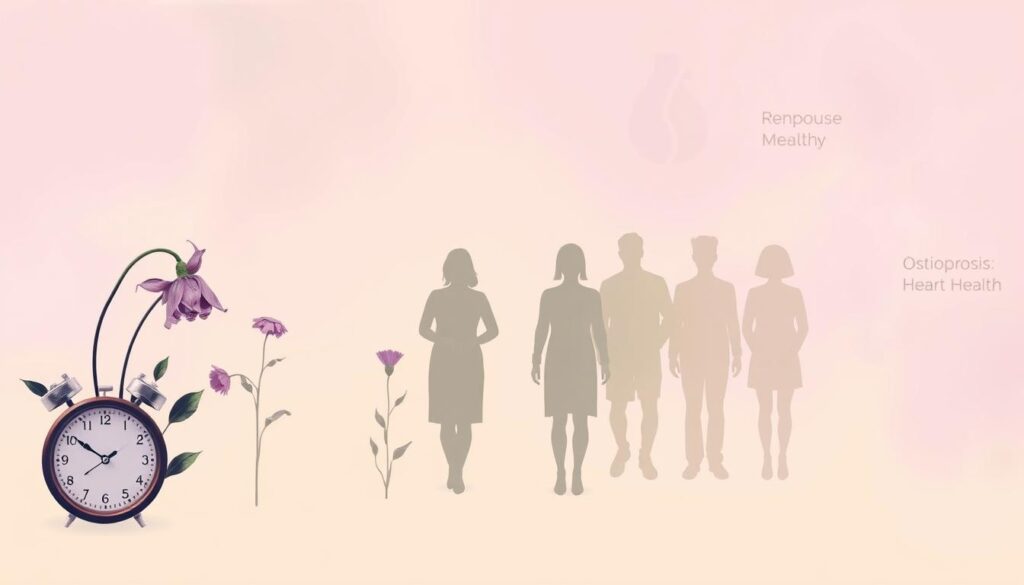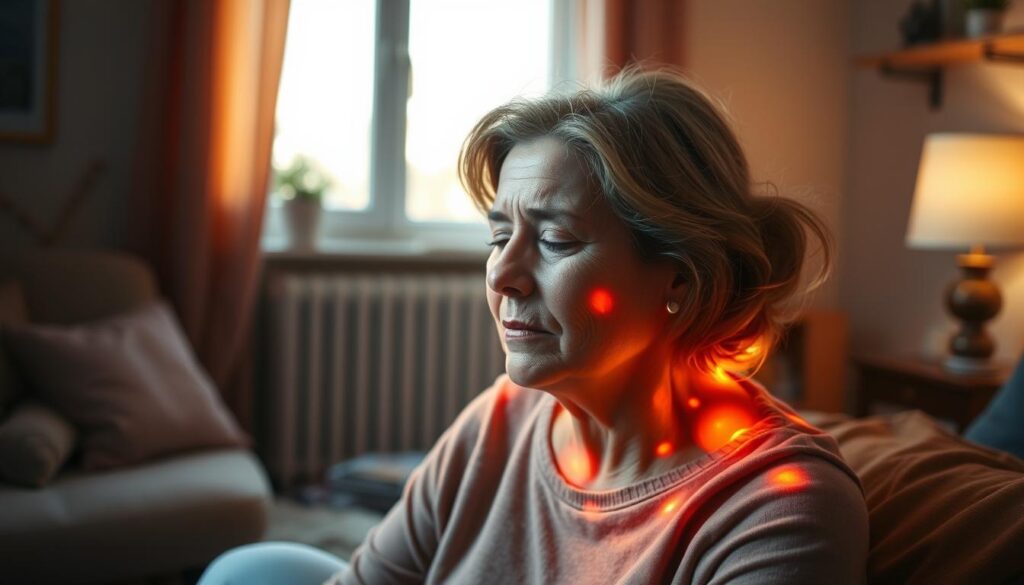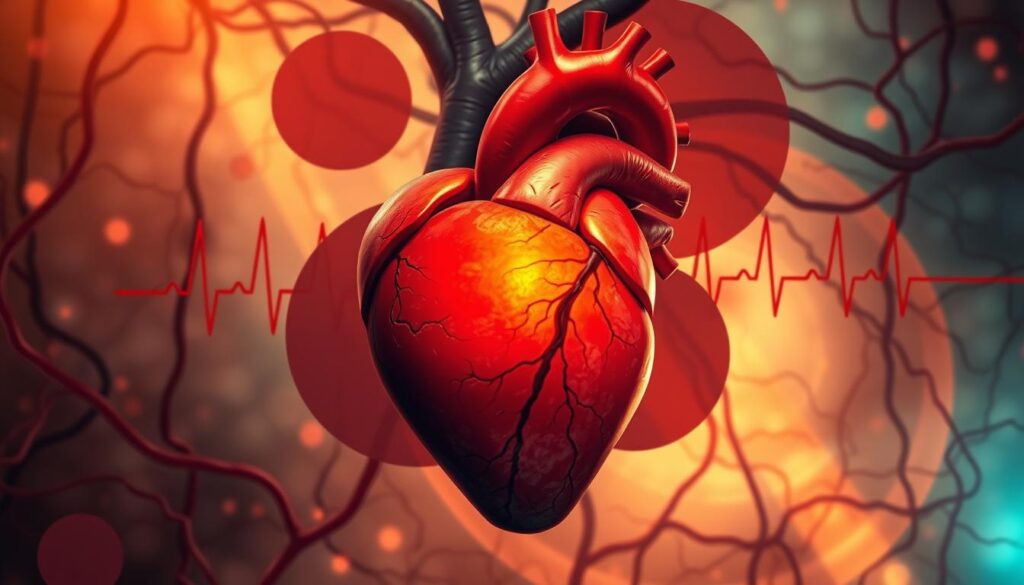Did you know over 1.2 billion women worldwide will go through menopause by 2025? This big change shows we need to know more about the health issues that come with it. Menopause means a woman’s menstrual cycle stops forever. It brings big changes in hormones that affect her body and mind.
In this guide, we’ll look at the main health problems women face during menopause. We’ll give you the key info to get through this big change with strength and confidence. We’ll talk about hot flashes, night sweats, bone health, and heart changes. Knowing about these hormonal shifts is key to staying healthy during and after menopause.

Key Takeaways
- Menopause affects over 1.2 billion women worldwide and brings significant hormonal changes
- Common menopause-related diseases include hot flashes, night sweats, osteoporosis, and cardiovascular issues
- Understanding the impact of hormonal shifts is crucial for managing menopausal health challenges
- Proactive management of menopause-related conditions can improve overall quality of life
- Seeking guidance from healthcare professionals is essential for navigating the complexities of menopause
Understanding Menopause and Its Impact on Women’s Health
Menopause is a natural process that ends a woman’s ability to have children. It brings big changes in hormones that affect health and happiness.
The Role of Hormonal Changes
Menopause happens when the ovaries make less estrogen and progesterone. These changes cause symptoms like hot flashes, night sweats, and mood swings. Knowing about these changes helps manage menopause better.
When Menopause Typically Begins
Women in the U.S. usually start menopause at 51. But, it can start earlier, even in the 40s. Things like family history and lifestyle can affect when it starts.
Natural vs. Surgical Menopause
Some women have surgical menopause when their ovaries are removed. This can make symptoms worse because of the sudden hormone drop.
Knowing about hormonal changes is key for managing symptoms. It helps women stay healthy during this big life change.
| Characteristic | Natural Menopause | Surgical Menopause |
|---|---|---|
| Onset | Gradual | Sudden |
| Hormone Levels | Gradual decline | Abrupt drop |
| Symptom Severity | Moderate | More severe |
| Treatment Approach | Lifestyle changes, hormone replacement therapy (HRT) | Hormone replacement therapy (HRT), additional therapies |
“Menopause is not just a physical event; it’s a profound life transition that can have significant emotional and social implications for women.”
Most Common Menopause Diseases and Conditions
Women going through menopause often face health challenges. It’s important to know about common menopause diseases and conditions. This knowledge helps with early detection and management.
Osteoporosis
Menopause brings a drop in estrogen, leading to bone loss. This can cause osteoporosis, making bones weak and prone to fractures. To fight this, women should get bone density tests and eat foods rich in calcium and exercise.
Cardiovascular Risks
Menopause affects heart health too. Hormonal changes can raise blood pressure and cholesterol, increasing heart disease risk. A healthy diet and regular exercise can help manage these risks.
Vaginal Atrophy and Urinary Issues
Menopause can cause vaginal atrophy, making the vaginal walls thin and dry. This leads to discomfort and pain during sex, and raises the risk of UTIs. Using estrogen therapy and vaginal moisturizers can help.
Mental Health Challenges
Menopause can also affect mental health, causing depression and anxiety. Women might feel mood swings, irritability, and changes in thinking. Getting help from doctors and practicing stress relief can help manage these issues.
By understanding and tackling common menopause diseases, women can stay healthy during this important time.
Hot Flashes and Night Sweats: Causes and Management
During menopause, many women face hot flashes and night sweats. These symptoms can really disrupt daily life. It’s important to know what causes them and how to manage them.
Identifying Trigger Factors
Hot flashes and night sweats can be caused by many things. Here are a few:
- Hormonal changes: Changes in estrogen levels can mess with the body’s temperature control, leading to heat and sweating.
- Stress and anxiety: Feeling stressed can make these symptoms worse, causing more intense episodes.
- Certain foods and beverages: Spicy foods, caffeine, and alcohol can trigger hot flashes and night sweats in some women.
- Environmental factors: Changes in temperature, humidity, or stress can also trigger these symptoms.
Treatment Options for Vasomotor Symptoms
There are many ways to manage hot flashes and night sweats. Hormone replacement therapy (HRT) is often very effective. For those who can’t or don’t want to use HRT, non-hormonal meds like antidepressants or gabapentin can help.
Lifestyle Modifications for Symptom Relief
Changing your lifestyle can also help with these symptoms. Here are some tips:
- Try relaxation techniques like deep breathing, meditation, or yoga to handle stress and anxiety.
- Stay away from foods and drinks that can trigger symptoms, like spicy foods, caffeine, and alcohol.
- Keep your environment cool by using fans, air conditioning, or wearing light clothes.
- Exercise regularly to boost your overall health and possibly lessen symptom severity.
By understanding the causes of hot flashes and night sweats, and trying different treatments and lifestyle changes, women can better manage these symptoms. This can greatly improve their quality of life.

Bone Health and Osteoporosis Risk During Menopause
Women face a higher risk of osteoporosis during menopause. This is due to hormonal changes, especially the drop in estrogen. Osteoporosis is marked by low bone density and a higher chance of fractures.
Estrogen is key for keeping bones healthy. It helps balance bone growth and loss. Without enough estrogen, bones start to weaken, raising the risk of osteoporosis.
There are ways to keep bones strong during menopause. Eating foods rich in calcium and vitamin D is important. Also, exercises like walking or strength training help bones stay strong.
Getting bone density tests, or dual-energy X-ray absorptiometry (DXA) scans, is crucial. These tests spot osteoporosis or bone loss early. Doctors might then suggest calcium supplements or other treatments to protect bones.
“Maintaining strong, healthy bones is a crucial aspect of overall well-being, especially for women going through menopause. By taking proactive steps, we can empower ourselves and reduce the risk of debilitating osteoporosis.”
Understanding the connection between menopause and bone health is key. Women can protect their bones by eating right, exercising, and getting bone density tests. These steps help keep bones strong and reduce osteoporosis risk during this important life stage.
Cardiovascular Changes and Heart Disease Risk
Women go through big changes in their heart health during menopause. It’s important to know about these changes to keep the heart healthy.
Blood Pressure Concerns
Menopause can lead to higher blood pressure. Hormonal shifts can cause blood pressure to rise. It’s key to keep an eye on blood pressure and manage it well.
Cholesterol Level Changes
Menopause also affects cholesterol levels. Lower estrogen levels can change the balance of good and bad cholesterol. This can lead to plaque buildup in arteries. Eating right and possibly taking medication can help manage cholesterol levels.
Preventive Measures
- Stay healthy with a balanced diet and regular exercise.
- Check blood pressure and cholesterol levels often. Work with a doctor to manage any changes.
- Consider hormone replacement therapy (HRT) with a doctor’s advice. It may help with heart health.
- Don’t smoke and drink alcohol in moderation. Both can harm the heart.
| Cardiovascular Risk Factor | Potential Impact of Menopause | Recommended Preventive Measures |
|---|---|---|
| Blood Pressure | Increased risk of hypertension | Regular monitoring, medication if necessary, and lifestyle changes |
| Cholesterol Levels | Unfavorable changes in LDL and HDL ratios | Dietary modifications, medication if necessary, and regular monitoring |
| Overall Heart Disease Risk | Elevated due to cardiovascular changes | Maintaining a healthy lifestyle, considering HRT, and regular medical checkups |
Knowing about the heart changes in menopause and taking steps to manage them can help women lower their heart disease risk. This way, they can keep their heart healthy during this time.

Vaginal Health and Urinary Issues
Menopause can change a woman’s vaginal and urinary health a lot. Two big worries are vaginal dryness and urinary incontinence.
When estrogen levels drop, the vaginal walls get thinner and less stretchy. This can cause dryness, irritation, and pain during sex. Luckily, treatments like topical estrogen and lubricants can help.
Urinary incontinence is also common in menopause. Hormonal changes and weaker pelvic muscles make it hard to control the bladder. Kegel exercises can help strengthen these muscles. For more serious cases, medications or surgery might be needed.
Addressing Vaginal and Urinary Concerns
- See your healthcare provider to find treatments for vaginal dryness and urinary incontinence.
- Do pelvic floor exercises every day to boost muscle strength and bladder control.
- Try topical estrogen therapy or lubricants to ease vaginal atrophy and discomfort.
- Make healthy lifestyle choices, like keeping a healthy weight and avoiding bladder irritants, to handle urinary issues.
“Taking care of your vaginal and urinary health during menopause is essential for maintaining overall well-being and quality of life.”
By tackling these common menopause worries, women can take charge of their health. This improves their daily life a lot.
Mental Health and Mood Disorders in Menopause
Menopause can really affect a woman’s mental health. Hormone changes often cause mood swings, including depression and anxiety. Women may also notice cognitive changes that make daily life harder.
Depression and Anxiety
Hormonal shifts in menopause can lead to depression and anxiety. Women might feel sad, hopeless, or overwhelmed. They may find it hard to handle the emotional ups and downs of this time.
Anxiety can also increase, causing worry, restlessness, and trouble focusing.
Cognitive Changes
Hormonal changes in menopause can affect how well women think. Some notice memory lapses, trouble focusing, and problem-solving challenges. These changes can make everyday tasks harder and affect quality of life.
Treatment Approaches
There are many ways to help with mental health issues during menopause. Therapies like cognitive-behavioral therapy (CBT) and mindfulness can help with mood swings, depression, and anxiety. Sometimes, hormone replacement therapy (HRT) or medications are used to help stabilize mood.
Women facing mental health challenges during menopause should get help. With the right support and self-care, they can get through this time more easily and stay well.
| Symptom | Potential Causes | Treatment Options |
|---|---|---|
| Depression | Hormonal changes, stress, life transitions | Therapy, medication, lifestyle changes |
| Anxiety | Hormonal fluctuations, changes in daily routines | Therapy, relaxation techniques, medication |
| Cognitive Impairment | Hormonal changes, stress, aging | Cognitive exercises, lifestyle modifications, HRT |
“Menopause is a natural transition, not a disease, and with the right support, women can navigate it with resilience and self-care.”
Treatment Options and Hormone Replacement Therapy
Women going through menopause have many treatment options. Hormone replacement therapy (HRT) is a popular choice. It helps manage symptoms like hot flashes and vaginal dryness.
HRT uses estrogen and sometimes progesterone to ease symptoms. It’s important to talk to a doctor about the risks and benefits. They can help decide if HRT is right for you.
Some women look for other ways to handle menopause symptoms. Complementary and alternative therapies include herbal remedies and acupuncture. Always check with a doctor before trying these options.
| Treatment Option | Potential Benefits | Potential Risks |
|---|---|---|
| Hormone Replacement Therapy (HRT) | – Alleviate hot flashes, night sweats, and vaginal dryness – Maintain bone health and reduce osteoporosis risk | – Increased risk of breast cancer, stroke, and blood clots – May not be suitable for women with certain medical conditions |
| Alternative Therapies | – Provide natural, non-hormonal options for symptom management – May offer additional benefits for overall well-being | – Varying levels of scientific evidence for effectiveness – Potential interactions with medications or underlying conditions |
Choosing a treatment for menopause should be a team effort. Talk to your doctor about what’s best for you. They’ll consider your health and what you prefer.
Conclusion
Menopause can cause health issues like hot flashes and night sweats. It also affects bone density and heart health. But, with the right knowledge and care, women can handle these challenges well.
It’s key to keep up with health checks and talk openly with doctors during menopause. Knowing the latest treatments and making lifestyle changes can help manage symptoms. This also lowers the chance of serious health problems later on.
Menopause is a natural part of life for women. With the right mindset, it can be a time of growth. By focusing on menopause management, health monitoring, and quality of life, women can face this stage with strength and confidence.
FAQ
Q: What are the most common menopause-related diseases and conditions?
A: Common menopause-related diseases include osteoporosis and heart diseases. Vaginal atrophy and hot flashes are also common. Mood changes and cognitive impairment are other issues women face.
Q: How do hormonal changes during menopause affect women’s health?
A: Hormonal changes, especially the drop in estrogen, can cause health problems. These include a higher risk of osteoporosis and heart diseases. Vaginal and urinary problems also become more common.
Q: What are the treatment options for managing menopause-related symptoms and diseases?
A: Treatments include hormone replacement therapy and lifestyle changes. Diet, exercise, and stress management are key. Alternative therapies and medications for specific conditions are also options.
Q: How can women prevent or manage hot flashes and night sweats during menopause?
A: Avoiding triggers like stress and spicy foods helps manage hot flashes and night sweats. Hormone therapy and non-hormonal medications are treatments. Dressing in layers and using fans can also help.
Q: What can women do to maintain bone health during and after menopause?
A: Eating a diet rich in calcium and vitamin D is crucial. Engaging in weight-bearing exercises is also important. Bone density tests and medication may be needed to prevent osteoporosis.
Q: How does menopause affect cardiovascular health, and what can women do to reduce their risk?
A: Menopause increases the risk of heart disease. A healthy lifestyle is key. This includes a balanced diet and regular exercise. Managing diabetes or high blood pressure is also important.
Q: What are the common mental health and cognitive changes associated with menopause?
A: Menopause can lead to depression, anxiety, and cognitive issues. Difficulty concentrating and memory problems are common. Therapy, medication, and lifestyle changes can help manage these issues.
Q: How does menopause affect vaginal and urinary health, and what can be done to address these changes?
A: Menopause causes vaginal dryness and urinary incontinence. Topical estrogen treatments and pelvic floor exercises can help. These interventions address vaginal and urinary health issues.
